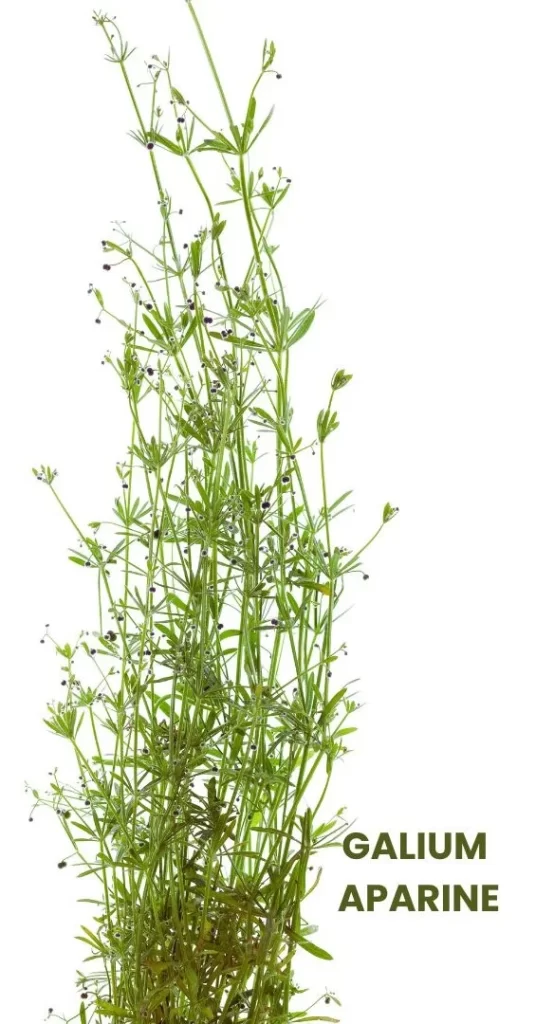Galium aparine, commonly known as Goose-Grass, is a medicinal herb with a long history of use in traditional medicine.
It is valued for its diuretic properties and its ability to address urinary disorders, skin conditions, and even certain types of cancerous growths.
This plant has been recognized for its potential to promote healthy granulation of ulcerated surfaces and to alleviate symptoms associated with various ailments.

SOURCE INFORMATION
Scientific Classification
- Kingdom: Plantae
- Clade: Angiosperms
- Clade: Eudicots
- Clade: Asterids
- Order: Gentianales
- Family: Rubiaceae
- Genus: Galium
- Species: Galium aparine
Origin
- Galium aparine, commonly known as Goose-Grass, is a herbaceous annual plant native to Europe, Asia, North America, and North Africa.
- It thrives in a variety of habitats including woodlands, hedgerows, and disturbed areas such as gardens and fields.
Historical Facts
- Galium aparine has a long history of traditional medicinal use dating back centuries.
- Ancient herbalists and traditional healers recognized its diuretic properties and used it to treat urinary disorders.
- It has also been employed in the management of skin conditions and certain types of cancerous growths.
- Historically, Galium aparine was utilized as a cleansing herb and tonic to promote overall health and well-being.
- In homoeopathic medicine, Galium aparine is valued for its therapeutic effects on urinary ailments, skin afflictions, and cancerous ulcers.
- It has been incorporated into various herbal preparations and tinctures for its medicinal benefits.
Homoeopathic Application
- In homoeopathy, Galium aparine is primarily used for its diuretic properties, making it valuable in the treatment of urinary disorders such as cystitis, dysuria, and gravel.
- It is indicated for conditions characterized by dropsies, where it helps to alleviate fluid retention and promote urine flow.
- Galium aparine is also utilized in cases of inveterate skin afflictions and ulcers, where it aids in promoting healthy granulation and healing of the affected tissues.
- Some homoeopaths suggest its use in cancerous ulcers and nodulated tumors, as it may modify or suspend cancerous actions.
- The remedy is typically administered in the form of a fluid extract, with recommended dosages ranging from half-dram doses diluted in water or milk, taken three times a day.
- Galium aparine’s therapeutic benefits align with the principles of homoeopathy, where remedies are chosen based on their ability to stimulate the body’s innate healing mechanisms and restore balance to the system.
DRUG PATHOGENESIS
- Galium aparine primarily acts on the urinary organs, exerting a diuretic effect.
- It is indicated for conditions such as dropsies, gravel, and calculi, where it helps to alleviate symptoms and promote urinary health.
- This herb possesses the ability to modify or suspend cancerous actions, making it beneficial in certain types of cancerous growths.
- Clinical evidence supports its use in cancerous ulcers and nodulated tumors of the tongue.
- Galium aparine is also known for its efficacy in treating inveterate skin afflictions and scurvy.
- It facilitates the formation of healthy granulations on ulcerated surfaces, aiding in the healing process.
KEY CHARACTERISTICS
- Diuretic properties.
- Beneficial effects on urinary disorders.
- Modifying or suspending cancerous actions.
- Healing properties for skin afflictions and ulcers.
- Clinical confirmation of efficacy in cancerous ulcers and nodulated tumors.
DETAILED ORGAN SYMPTOMS
URINARY SYSTEM
- Dysuria: Galium aparine is indicated in cases of painful or difficult urination, where there may be a sensation of burning or discomfort during the passage of urine.
- Cystitis: It is used to address inflammation of the urinary bladder, often associated with symptoms such as frequent urination, urgency, and pain or discomfort in the pelvic region.
- Gravel and Calculi: Galium aparine is beneficial for conditions involving the formation of urinary stones (gravel) or calculi (stones) in the kidneys, bladder, or urinary tract.
- It helps to alleviate symptoms and promote the expulsion of these calculi.
- Dropsies: This term refers to the accumulation of excess fluid in the body’s tissues, leading to swelling (edema).
- Galium aparine is effective in cases of dropsy, where it acts as a diuretic to increase urine production and facilitate the removal of excess fluid.
SKIN
- Inveterate Skin Afflictions: Galium aparine is useful in the management of chronic or long-standing skin conditions, such as eczema, psoriasis, or dermatitis.
- It helps to relieve symptoms such as itching, inflammation, and the formation of lesions or eruptions on the skin.
- Ulcerated Surfaces: In cases where the skin is ulcerated or has open wounds, Galium aparine promotes the formation of healthy granulation tissue, aiding in the process of wound healing and tissue repair.
- Healthy Granulations: Galium aparine supports the development of healthy granulation tissue on ulcerated surfaces, facilitating the formation of new blood vessels and connective tissue essential for the healing process.
- It helps to prevent infection and promotes the growth of new skin cells, leading to the restoration of damaged tissue.
DOSE
- Galium aparine is typically administered in fluid extract form.
- Half-dram doses in a cup of water or milk, three times a day.
Frequently Asked Questions
What is Galium aparine used for?
- It is used primarily for urinary disorders, skin conditions, and certain cancerous growths.
How is Galium aparine administered?
- It is typically taken in the form of fluid extract, with half-dram doses diluted in water or milk, three times a day.
Meaning of Difficult Words
- Diuretic: A substance that increases urine production.
- Dysuria: Painful or difficult urination.
- Cystitis: Inflammation of the bladder.
- Gravel: Small, hard deposits that form in the kidneys and are passed during urination.
- Calculi: Solid concretions or stones formed in the body, typically in the kidneys or gallbladder.
- Inveterate: Persistent or long-standing.
- Granulations: Small, granular projections of tissue, often seen during the healing process of wounds or ulcers.
